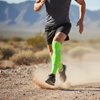
Compression Sleeves vs Compression Socks — Which Are Better for Athletes?
, by Brandon Eenink , 3 min reading time

, by Brandon Eenink , 3 min reading time
If you’ve ever wondered whether you should wear compression socks or compression sleeves, you’re not alone.
Both are designed to support circulation, reduce muscle fatigue, and speed up recovery but they’re not exactly the same.
So which one is better for your training, recovery, and comfort?
Let’s break it down. 👇

Compression socks cover your entire lower leg and your foot.
They provide uniform pressure from your ankle all the way to your toes.
Compression sleeves, on the other hand, cover only your calves leaving your feet free.
They’re focused entirely on supporting the calf muscles and improving blood flow between your ankle and knee.
Both have benefits, but their function and feel can be quite different depending on your sport.
Compression sleeves apply graduated pressure from the ankle upward, helping push blood back toward your heart.
This improves oxygen delivery and helps flush out lactic acid — reducing soreness and fatigue after training.
They’re ideal for:
Runners
Cyclists
Hikers
Gym or endurance athletes
Compression socks offer similar circulation benefits, but because they also compress the feet, some athletes find them too tight or restrictive for long sessions.
👉 Winner: Compression Sleeves better balance between performance and comfort.
Because sleeves don’t cover the feet, they’re cooler, lighter, and easier to combine with your favorite performance socks.
They’re also easier to take on and off, especially after sweaty training sessions.
Compression socks, while supportive, can trap more heat and moisture not ideal for long-distance runners or summer rides.
👉 Winner: Compression Sleeves more breathable and flexible in all conditions.
Both options help recovery, but sleeves shine when you want targeted compression right where you need it most the calves.
This makes them excellent for post-run or post-cycling recovery when your lower legs feel heavy or sore.
You can even wear them during sleep or travel to prevent swelling and stiffness.
👉 Winner: Compression Sleeves – focused recovery and muscle stability.
Running & Cycling: Sleeves dominate for flexibility and cooling.
Winter Training: Socks may help a bit more with warmth.
Everyday Use or Travel: Sleeves are discreet and comfortable.
👉 Winner: Depends on the activity but sleeves fit more athletes, more often.
Compression socks are great for general circulation but compression sleeves give you more freedom, comfort, and targeted support during performance.
They’re lighter, cooler, and easier to integrate into your daily training routine.
That’s why more and more athletes are switching to
Actvizy™ Compression Calf Sleeves designed for better circulation, faster recovery, and ultimate comfort mile after mile.


